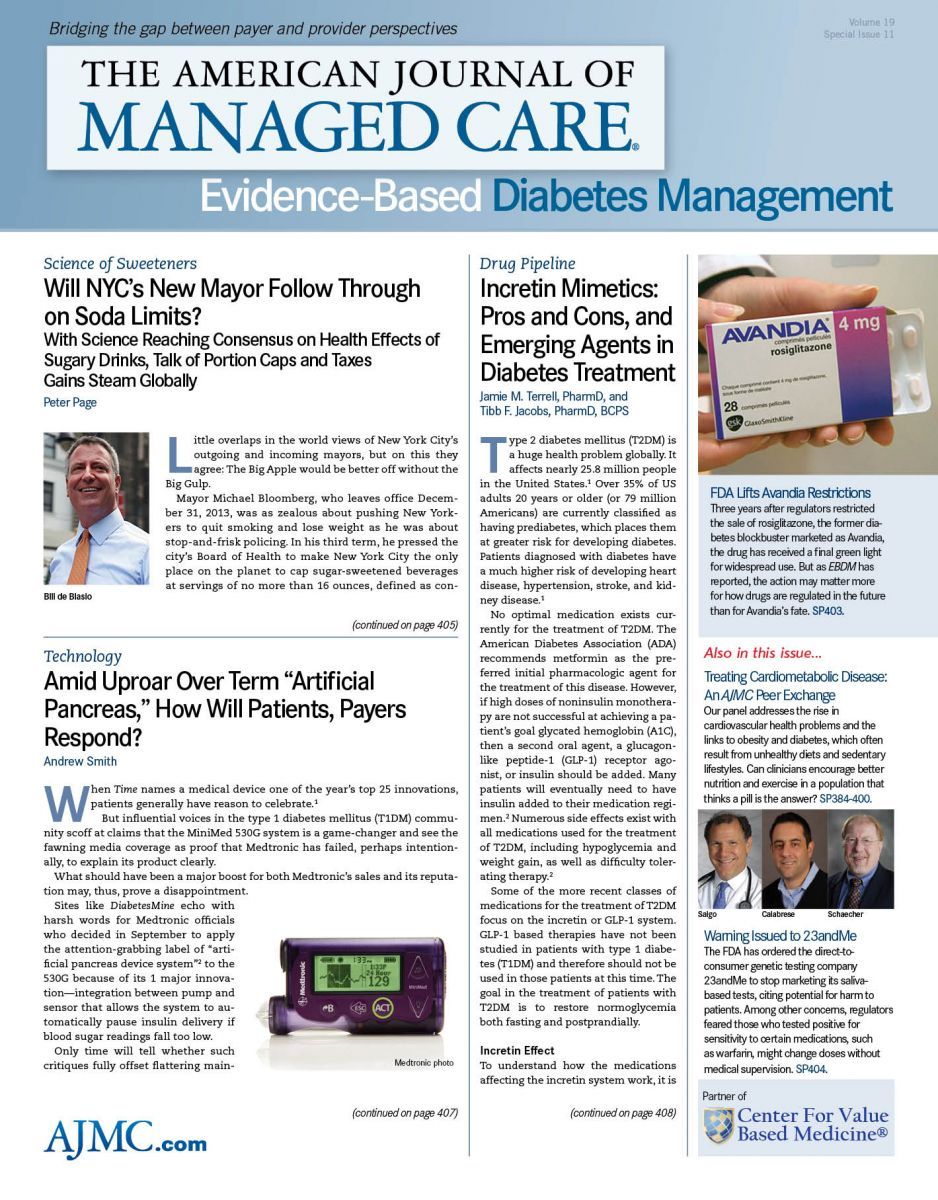- Center on Health Equity & Access
- Clinical
- Health Care Cost
- Health Care Delivery
- Insurance
- Policy
- Technology
- Value-Based Care
FDA Lifts Avandia Restrictions, but Most Find Action Moot
Rosiglitazone, the former blockbuster diabetes drug marketed by GlaxoSmithKline as Avandia, received a final green light for widespread use November 25, 2013, from the US Food and Drug Administration (FDA), 3 years after those same regulators bowed to pressure from outside researchers to restrict the drug’s use.
In its statement, the FDA said it had determined that Avandia, as well as related drugs and generics containing rosiglitazone, “do not show an increased risk of heart attack compared to standard type 2 diabetes medicines metformin and sulfonylurea. As a result, we are requiring removal of the prescribing and dispensing restrictions … that were put in place in 2010.”1
At its peak, Avandia was top seller for GSK; it was approved in 1999 and reached $3.2 billion in sales in 2006.2 But a meta-analysis published in The New England Journal of Medicine by Steve Nissen, MD, head of cardiology at the Cleveland Clinic, raised questions about whether the drug caused heart attacks; the FDA ultimately curtailed Avandia’s use to only a few thousand patients enrolled in special programs.3
The FDA withdrew its restrictions based on a review of data from the RECORD trial by the Duke Clinical Research Institute.1 As reported in Evidence-Based Diabetes Management in September, that effort, known as a readjudication, confirmed the findings that Avandia did not present serious cardiovascular risk in patients while pointing out problems in the design of GSK’s initial trial.3 The FDA action followed an advisory panel recommendation on June 6, 2013.3
Experts who spoke with EBDM in September and those reacting to the November 25 announcement agreed that lifting restrictions now would have little practical effect; first, the public battering that Avandia received—and the payouts GSK made over its use4— have damaged the drug’s reputation, despite what the science now says.3,5 Second, and more importantly, newer drug classes have emerged, including the SGLT2 inhibitors (sodium glucose co-transporter 2), a new type of treatment for type 2 diabetes to control hyperglycemia.
Despite the settlements, GSK defended Avandia’s safety, and its statement after the FDA’s action reflected that stance. “GSK welcomes the decision of the FDA and appreciates the agency’s robust review of the science with regard to Avandia. GSK maintains its view that Avandia is a safe and effective treatment for Type 2 diabetes when used appropriately,” the statement said.
“The company will work with the FDA to update labeling and to implement the agency’s decisions regarding easing restrictions on the medicine.”6 There were no comments from GSK at press time on whether the company planned to market the drug again in the United States.
References
1. FDA Drug Safety Communication: FDA requires removal of some prescribing and dispensing restrictions for rosiglitazone-containing diabetes medicines. FDA website. http://www.fda.gov/Drugs/DrugSafety/ucm376389. htm. Published November 25, 2013. Accessed November 25, 2013.
2. Thompson D. FDA to lift restrictions on diabetes drug Avandia. HealthDay. http://health.usnews.com/health-news/news/articles/2013/11/25/fda-to-lift-restrictions-ondiabetes-drug-avandia. Published November 25, 2013. Accessed November 30, 2013.
3. Regan TL. FDA “mea culpa” part of cautionary tale. Am J Manag Care. 2013;19:SP7; SP242-SP243.
4. Frankel A. Avandia case: the new normal for plaintiffs’ fees in mas torts? Reuters. January 23, 2013. http://blogs.reuters.com/alison-frankel/2013/01/23/avandia-case-the-new-normal-for-plaintiffs-fees-in-mass-torts/ Accessed November 30, 2013.
5. FDA reverses course on Avandia warning, lifts safety restrictions. CBSNews.com. November 25, 2013. http://www.cbsnews.com/news/fdareverse-course-on-avandia-warning-lifts-safetyrestrictions/. Accessed November 30, 2013.
6. Mary A. Rhyne, spokesperson for GlaxoSmith-Kline [mary.a.rhyne@gsk.com]. November 25, 2013.

Quality of Life: The Pending Outcome in Idiopathic Pulmonary Fibrosis
February 6th 2026Because evidence gaps in idiopathic pulmonary fibrosis research hinder demonstration of antifibrotic therapies’ impact on patient quality of life (QOL), integrating validated health-related QOL measures into trials is urgently needed.
Read More
Building Trust: Public Priorities for Health Care AI Labeling
January 27th 2026A Michigan-based deliberative study found strong public support for patient-informed artificial intelligence (AI) labeling in health care, emphasizing transparency, privacy, equity, and safety to build trust.
Read More
Ambient AI Tool Adoption in US Hospitals and Associated Factors
January 27th 2026Nearly two-thirds of hospitals using Epic have adopted ambient artificial intelligence (AI), with higher uptake among larger, not-for-profit hospitals and those with higher workload and stronger financial performance.
Read More
Motivating and Enabling Factors Supporting Targeted Improvements to Hospital-SNF Transitions
January 26th 2026Skilled nursing facilities (SNFs) with a high volume of referred patients with Alzheimer disease and related dementias may work harder to manage care transitions with less availability of resources that enable high-quality handoffs.
Read More
